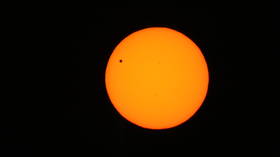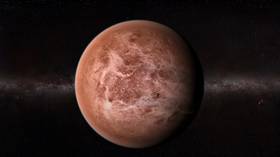It may be a ‘living hell,’ but it’s a ‘Russian planet’: Moscow will focus efforts on exploration of Venus, space agency chief says

Moscow plans to send its own mission to Venus in addition to the planned ‘Venera-D’ joint mission with the US, according to the head of its space agency Dmitry Rogozin, who believes the second planet from the Sun is “Russian.”
Speaking at the HeliRussia-2020 exhibition, a convention focused on the Russian helicopter industry, Rogozin announced that Roscosmos plans to focus its efforts on Venus.
“We believe that Venus is a Russian planet, so we shouldn’t fall behind,” he said. “Missions to Venus are a part of the government’s program of Russia’s space exploration for 2021-2030.”
According to current plans, Russia’s next expedition to Venus is scheduled for the late 2020s, as a joint mission between Roscosmos and NASA. In addition, the country is developing its own Venus exploration program, which will send at least three research vehicles to the planet.
Scientists at the United Kingdom’s Cardiff University recently published a paper hypothesizing that Venus’ clouds may be inhabited by living organisms. The researchers found phosphine gas in the planet’s atmosphere, a substance which on Earth is associated with life. As things stand, the gas remains unexplained.
When it comes to searching for life on other planets, Venus is relatively low down the list. Although a similar size to Earth, it has an atmosphere of 97 percent carbon dioxide and an average temperature of 464 degrees Celsius. In 1970, the Soviet probe Venera 7 became the first-ever spacecraft to successfully land on another planet and transmit data back to Earth. Earlier Venera missions either crashed or were crushed by atmospheric impact before landing. No other country has ever managed to land on the planet.
“Our country was the first and only on Venus. Our equipment was there, and it conducted research. In general, it is a living hell,” Rogozin said.
Also on rt.com A ‘Second Earth’ somewhere in space? Russian scientists have PHOTOS of microorganism fossils likely to be from ANOTHER PLANETThink your friends would be interested? Share this story!














